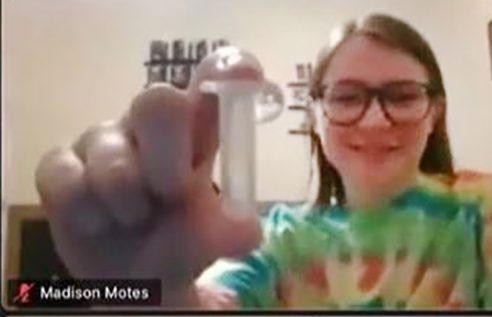CLEMSON, S.C. – A collaborative team of undergraduate students recently took first place in the Clemson COVID Challenge, a summer virtual research and design opportunity that involved 86 teams and more than 500 participants.
The event provided an opportunity for undergraduates to work on problems related to the current COVID-19 situation as well as future possible pandemics.

The winning entry investigated a new type of diagnostic test in saliva for rapid, on-site detection using minimal equipment: vials containing water, buoyant microballoons and magnetic particles, as well as a magnet and a smartphone video camera. The team was mentored by Clemson University Wallace R. Roy Distinguished Professor Jeff Anker.
Brandon McNaughton, the inventor of the essential technology used by the students and founder of the corporate partner, Akadeum Life Sciences Inc., explained, “When both buoyant and magnetic beads bind to viral protein, they form a ‘buoyant and magnetic (BAM) sandwich’ which floats to the surface and can be pulled by magnets. The presence of these sandwiches may be useful to quickly identify the viral infection. The promise of the method is that very low concentrations of virus can be detected in around 15 minutes with little to no equipment.”
“Our BAM approach is designed to be sensitive, rapid and user-friendly for on-site COVID-19 tests in universities, nursing homes, urgent care facilities, businesses, dentist’s offices and events,” said Anker, a professor in the College of Science‘s department of chemistry as well as a Senior Member of the National Academy of Inventors. “Currently available approaches are either not sensitive enough or are not rapid and deployable on site. Our BAM approach is still in its early stages, but it builds on robust established technologies and, if successful, could be rapidly scaled up to millions of tests per day.”
The team’s undergraduate Clemson students were junior bioengineering major Ryan Hernandez-Cancela of Sunset, South Carolina; senior biological sciences major Symphanie Key of Concord, North Carolina; senior health sciences major Alessia Keane of Wrentham, Massachusetts; senior biochemistry major Mandolin Lucier of Pendleton, South Carolina; and senior chemistry major Madison Motes of Piedmont, South Carolina. One member of the team was from the University of South Carolina: senior bioengineering major Shrey Patel of Orangeburg, South Carolina.
“This was a highly collaborative project,” Anker said. “The winning team of six undergraduates from Clemson University and the University of South Carolina worked together to develop a novel type of rapid diagnostic COVID-19 test.”
Most of Anker’s team worked from home and communicated online, but the team was assisted by two postdoctoral fellows and one graduate student – Unaiza Uzair of Lahore, Pakistan; Md. Arifuzzaman of Comilla, Bangladesh; and Chuanlei Wang of Jinan City, China – who sent the undergrads vials of magnetic microbeads, buoyant microballoons, proteins to use in their experiments, and 3D printed magnet holders designed by the students. No actual viruses were used. The undergraduate students also interviewed a variety of healthcare workers and clinicians to detail how and why this COVID-19 test works in the hospital and remote clinical setting. Dr. Philip Moschella, an emergency medicine physician at Prisma Health, also co-mentored the students. In addition, they produced a video pitch and helped prepare this media release.

“I’m grateful for the Clemson COVID Challenge and the faculty that organized it,” Hernandez-Cancela said. “Most if not all research opportunities were canceled as a result of the pandemic, so this challenge offered a safe and enjoyable alternative for a productive summer. I’m proud of everything we’ve accomplished, and I’m excited about the future impact of this new COVID test.”
As Clemson continues to test students, staff and faculty using standard diagnostics, university researchers are also taking voluntary saliva samples so that the BAM test and others being developed at Clemson can eventually be validated against real specimens. They call this “Spit for Science.”
The Clemson COVID Challenge was a collaboration between institutions across the state. Faculty and students came together to tackle problems related to the current COVID-19 situation as well as future possible pandemics. The teams had four weeks to develop their ideas and were then required to submit a 3-minute video pitch on the work they completed and their plans. The top eight teams conducted live, virtual Q&A’s with judges, and then were awarded up to $5,000 to continue their work and research.
Clemson University Ron and Jane Lindsay Family Innovation Professor Delphine Dean spearheaded the competition.
“The multidisciplinary teams had students and mentors from different institutions and majors working together to develop innovative solutions to the problems we face today,” said Dean, a faculty member in the department of bioengineering. “We’ve all been extremely proud of the students’ passion, creativity and accomplishments.”
Corporate partner Akadeum Life Sciences, Inc is a life sciences company in Ann Arbor, Michigan, founded in 2014 to create advanced isolation products.
– Additional reporting was provided by Rachel Allgood.
Get in touch and we will connect you with the author or another expert.
Or email us at news@clemson.edu

